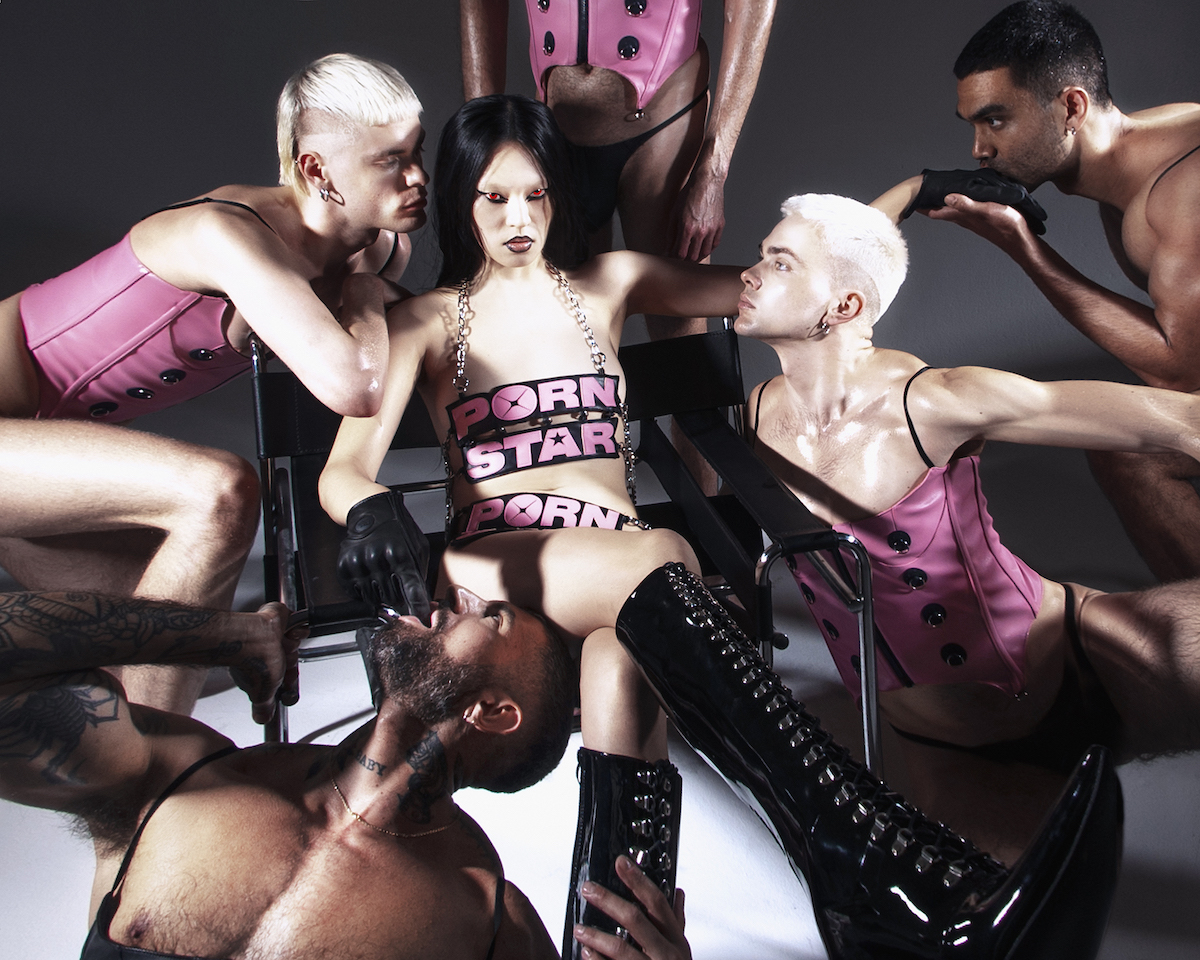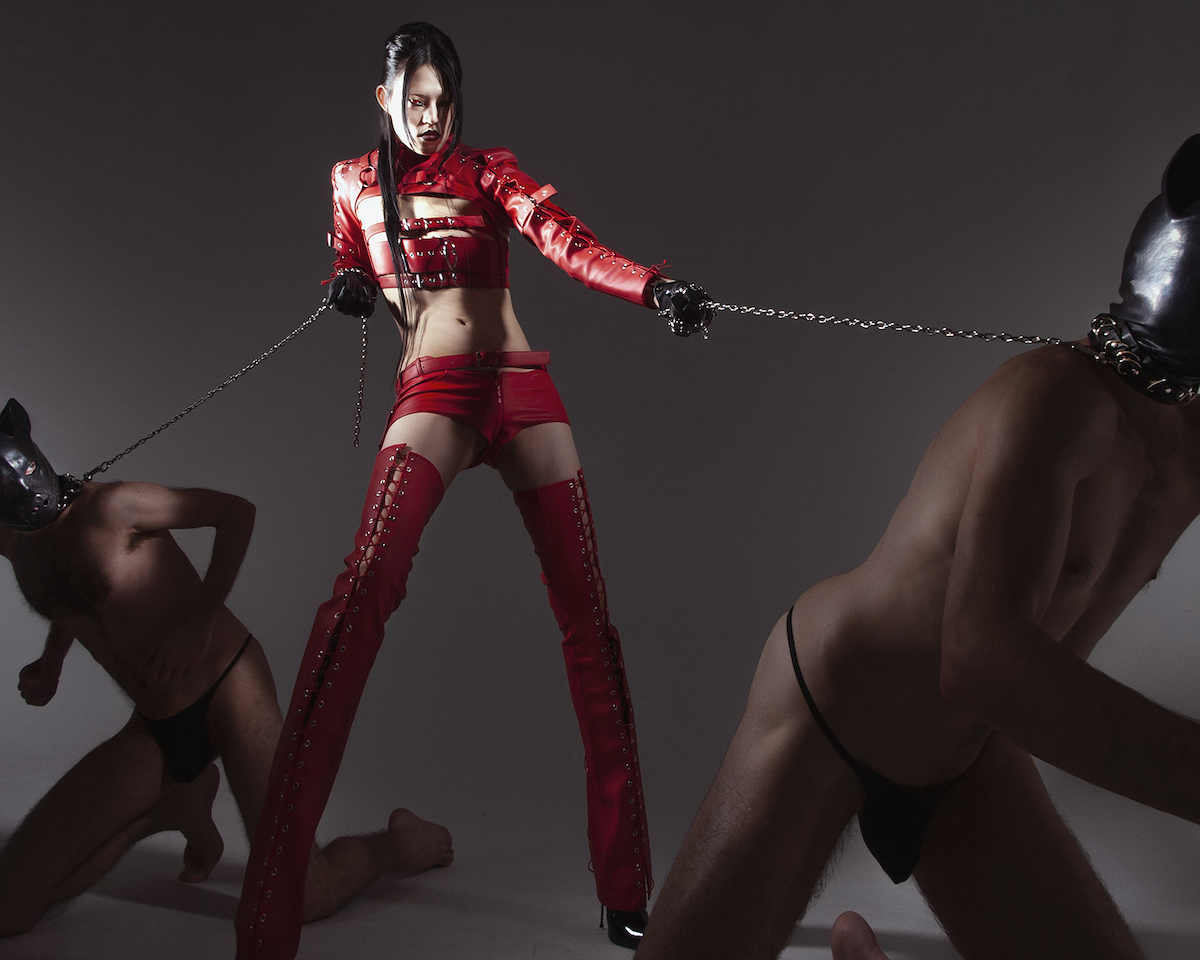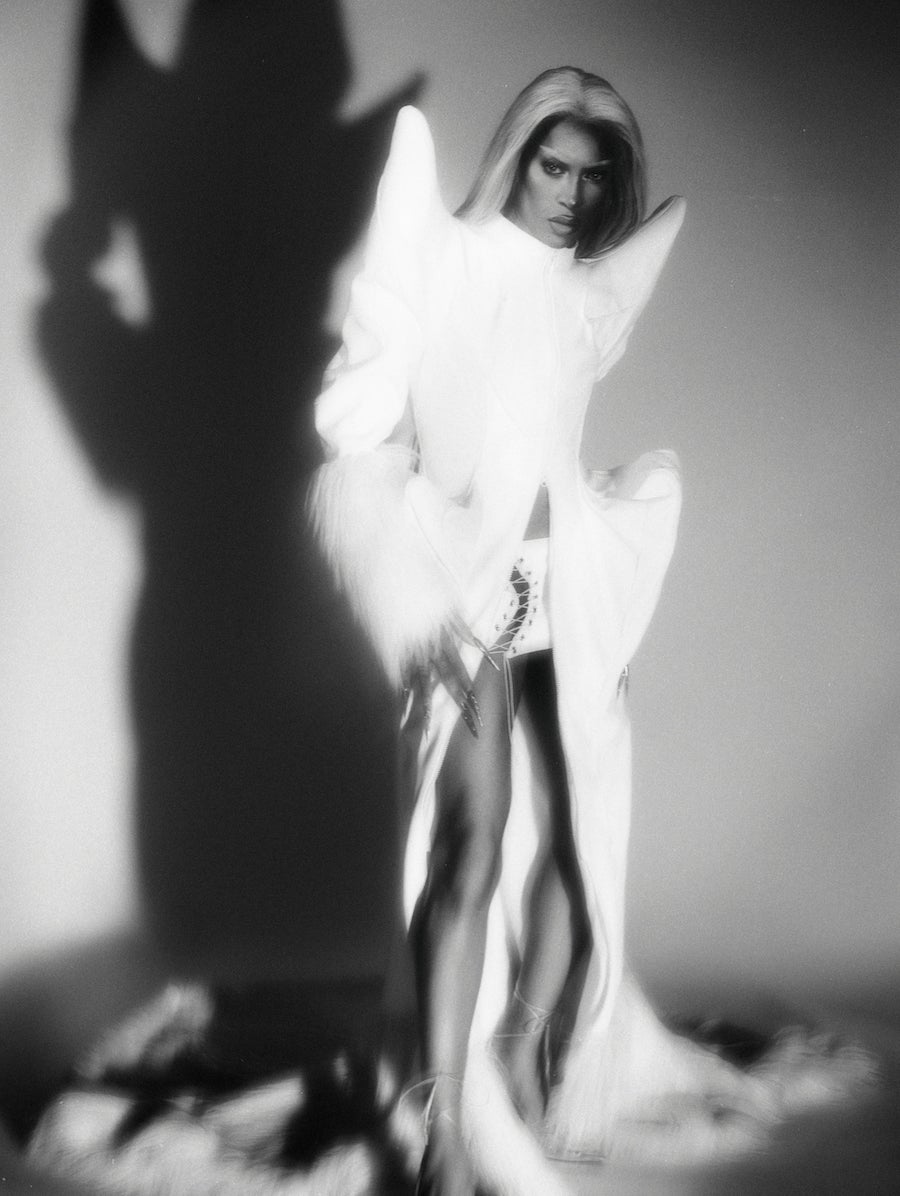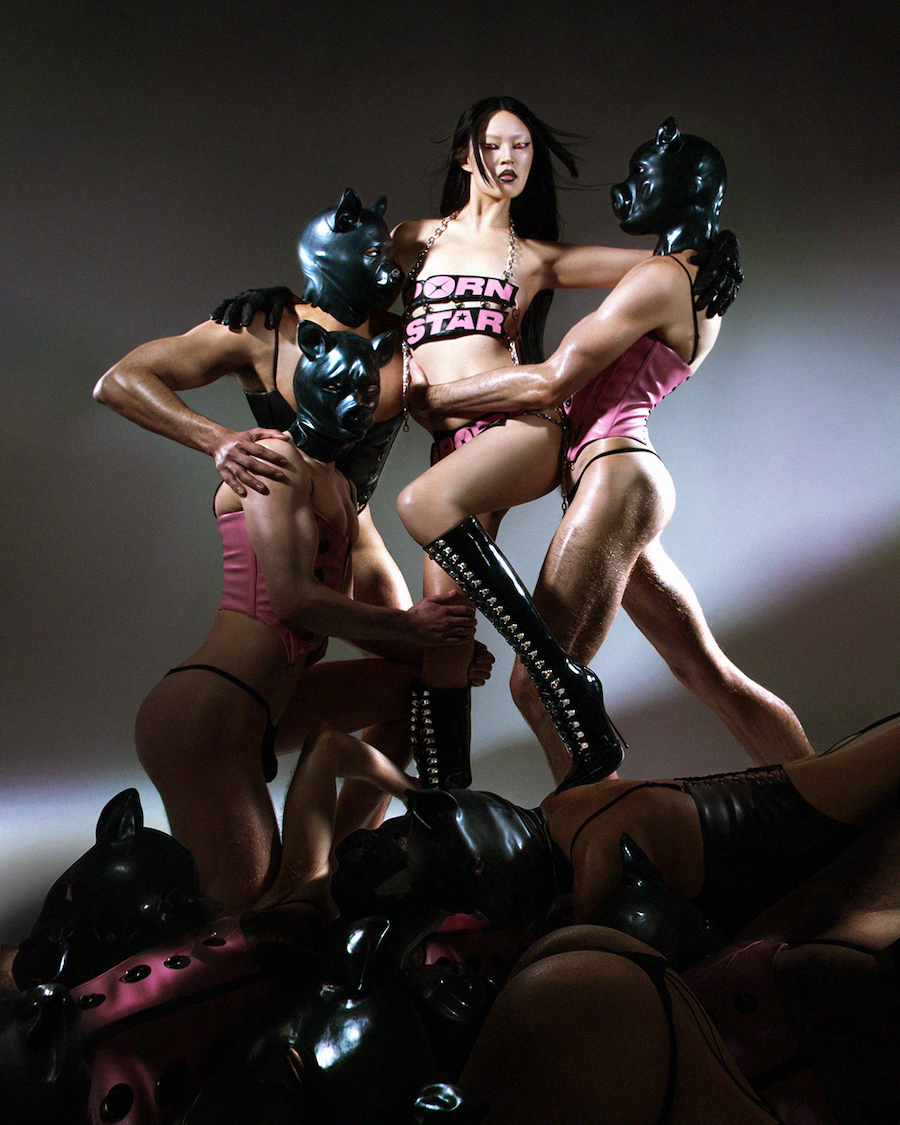The provocative energy we all need in our life.

A force that’s here to stay, Berlin brand Namilia is the provocative energy we all need in our life. Founded in 2015 by Nan Li and Emilia Pfohl, Namilia is founded on the idea that “fashion is political.” Within this framework, they make bold political statements that celebrate sex positivity in a totally gender-neutral way – think Berlin clubwear to the max. Turning heads at Berlin Fashion Week, Namilia is carving a space for its voice to be heard. As we approach the Namilia weekender at the Glamcult Store – May 17th to 19th – we got the chance to catch up with the trailblazers, to talk all things from the “Namilia youth movement” to their SS24 collection “In the loving memory of my sugar daddy!”
Hey guys, so nice to meet you! How are you doing today?
E: Good, good, good.
N: I mean… I’m in Mexico, so :p
So fun! Let’s start from the early days of Namilia. Founded in 2015, take me through the beginning of the brand. How did you guys meet and what made you want to start?
E: So we both studied together in Berlin at the University of Arts, I think it was during a group project, and we somehow ended up in the same team. And ever since that project, we started discussing making a brand together, we loved working together and it was an instant click. Then Nan went to London to do a master’s and I stayed in Berlin for a while. But actually ended up following Nan to London for some internship and then we founded the brand. I guess that we knew from the beginning that we wanted to do something together, something really special and meaningful. And yeah, that’s how we started.
And you guys are based in Berlin what does it mean for a brand to be based there? In other words, how do you think being in Berlin influences Namilia’s identity?
N: We’re such a, like, music festival, club scene inspired brand. Of course, that’s not all we do, but in the beginning, we did a lot of music videos for example. It is just overall really inspiring to be in Berlin, it’s a lot more underground and a bit cooler – more forward. Things like the techno scene, and generally the music scene, are just very fun to bring to American, and West Coast customers.
E: And also our clothing in general is made from and for Berlin. When we started we wanted to really focus on materials that were durable and stretchy but also comfy and sexy. Something you can just throw on and look effortlessly cool and you’re ready to go dance all night long.
It’s also quite interesting because you guys are very much bringing Berlin’s edgy identity, but take it elsewhere, which is very cool as you can see how people get to interpret the looks in their own way and in their own city.
E: It’s so funny because when we started, nobody knew that we’re based in Berlin. Back in the days we really had no fan base in Berlin, but now that the brand is growing people are realizing that we are based there and not in like LA or something.
Hahaha. And how would you guys describe NAMILIA in three words?
E: Equality, empowerment and freedom to dress the way you want!
Before we jump into your collections, we want to know a bit about your ethos. Namilia’s identity is kind of built on the statement that fashion is political. Can you tell me more about that?
N: When I think about the past, clothing was really used for political statements. Think of youth cultures, like punks or hippies, their clothes were a result of a political view or a social movement and that clothing became a symbol of that movement. So when it comes to self expression, it was always my goal to think that when people wear Namilia, they also stand with values. Gender fluidity, feminism, empowerment in general, have always been really important for us. It’s more established within the runway shows where we have more creative expression, but yeah, that’s kind of the idea behind it, to have a Namilia, youth movement.
E: We think it’s so crazy that society still tries to put everyone into boxes, so that’s why we want to create fashion that’s not just for one gender and can be worn by everyone.

Yeah exactly, everything is political in life and it’s really good that a brand like this is taking the risk of trying to introduce a full political identity that’s tied to fashion.
E: Women and queer people for example, they get judged all the time for what they wear. They can’t really show their inner personality or, I mean they can, but if they do, they have to deal with a lot of shame and aggression. We need to work towards changing this.
I can also see how through your clothes, queer people and women kind of create a safe space – a uniform almost. I think that the political side of it also comes with being in contact with different communities. How does this relationship between you and your communities feel?
N: For us it is really just reality. In our team we have transgender people, we have many many women. And literally only one straight guy ahaha. I think for another company, people would be really crazy to have an environment like this, but for us, this is our reality. As soon as we step out of the office, get onto public transport, you can really sense a really different reality. If we think about queer movement and female empowerment, we’ve come such a long way, but now, in America, it’s all going backwards again. So, I think you can never really take anything for granted. It’s all about progress, but if you don’t fight for your rights, they can be taken away at any moment depending on how the general political landscape is changing. In our reality, day to day, it’s really the symbiosis of getting inspired and inspiring and empowering people.
Yeah, I think it’s also interesting what you said about this brand being based on progress. But there’s also a big stress on the empowerment of people, not just the progress. And here empowerment becomes really crucial cause it can keep people safe and feel comfortable in their own skin. I’m really curious to know, what’s it like working in a duo?
N: I’m on the creative direction side and Emilia is the business and operations side, so we’re quite separated. But we still check with each other all day long, all the time, but still kind of, we have separated responsibilities and I think it’s quite nice.
E: I think so too. But at the end, everything comes back together because when it comes to selling the clothes, we’re always in contact. I mean, I couldn’t imagine running a brand by myself, having all the responsibility on myself. You always have someone to fall back on and talk to. It’s always like a shared responsibility in general. But on the other hand, we do challenge each other quite a lot. I mean, we started when we were students, and both had no clue what we were doing. But it’s been a super exciting experience so far, and we are still learning along the way. But I can definitely say the most important thing is that we’re growing together, challenging and supporting each other.
It’s always good to have someone to talk to that just balances things out, you can also tell by the quality of everything you do.
E: That’s so true because, for example, Nan is super delusional sometimes ahah! I’m like the opposite and then we just meet in the middle because I’m too realistic. It’s a good exercise to stay open minded.

I’m dying to get into your SS24 collection, “In the loving memory of my sugar daddy!” What was the inspiration behind it?
N: It’s a really kind of ironic way of talking about the gender pay gap in the bigger picture of work environments. Until not that long ago, women were fully depended on their male partners, I mean they couldn’t even get their own credit card! Can you imagine how insane? We thought it would be a fun, humorous way to turn everything around and say the Namilia girl is the OG gold digger, professional level gold digger, and is using the male person just to get ahead in the game. Using him for money, for pleasure, doing all that with confidence. So it’s a really exaggerated statement because I think women get kind of, as Emilia said, put into a box. If you marry someone rich, it’s just one money, but for us, we wanted to kind of turn it around and show that all the Namilia women are eventually gonna get ahead, get in front of everyone else.
Even the obsession of putting women into certain aesthetics when it comes to fashion can really limit their personality. But you guys really use irony to narrate a story, more than just finding one aesthetic and sticking to it at all costs.
N: Absolutely.
E: It’s crazy how many rules there are for women. We are always getting judged, if we’re dressing too sexy, we’re like whores. But If we’re dressing too uptight, we’re boring. It’s just super unfair. So we always kind of play with over sexual elements, and we make the clothes too tight, or the skirts too short.
I also want to know about the kind of satire behind the titles and the play of it all. How do you think irony impacts your brand?
N: I think with irony, you can go even a bit further. The things we talk about are political and to us, they are obviously very serious. But I feel fashion can be something fantastical. You know, especially nowadays there are so many brands. There are so many options. If you want a black basic t-shirt, there are a million that are really nice. So within our niche, we decided to do mainly statement pieces. I think irony allows us to kind of talk about political and very serious things, but still package it as something fun, fashionable, something that can be teasing. We also don’t want to be perceived as frustrated or angry because for us it’s still fashion and it should be something we want to keep positive.
E: Yeah and also we want to have fun while doing it. And as Nan said, I think you can reach a lot more people if you package it up nicely and if it’s a bit more ironic and fun.
I found it so hilarious how you got a little bit in trouble with Hermes for their Birkin. You just reworked this piece that holds so much meaning and made it into clothes. How do you go from choosing a particular accessory to then turning it into garments or clothes?
N: I think our approach is quite pop art and postmodern. So, we take something cultural that has a lot of meaning and put it into a new context. We really want our design language to be very approachable so that a lot of people understand. I don’t want the brand to come across as over intellectualised. I like it when it’s visually clear what we’re saying. The same goes for art, I don’t want to see something and then have to read a whole paper about it to understand what it means. The Birkin just symbolizes the ultimate symbol of money and fashion, and we’re just cutting up your 500 000$ crocodile bag and turning it into a mini skirt.
E: And I mean the best part was seeing Hermes not approving of it, that’s how you know you made the right decision.
I’m all about the deconstruction and the chaos and new context that is just like so visually translated into Namilia.
N: For me, it’s always the goal. When you see the collection and you can understand what it is about, it’s quite clear.
E: When Nan designs, we put all the ideas of that one collection or theme into one look to make sure that it actually works. So you can really spot the pieces that can give you the overall feeling of the collection.

Namilia is really new but also has gained a lot of popularity in a relatively short amount of time. What has been your biggest accomplishment so far?
E: I think as a company we put a lot of hard work into finding good people and treating them well. We’re more like a family than a company. That’s something we’re really proud of. Personally, I can’t pick one single thing because it’s so much happening, but when we won the case against Hermes, that made me super proud and it was just really exciting. But also seeing our customers feel confident in our clothes, seeing how much it’s empowering for them, it makes me super happy.
And what about the biggest challenge?
E: Biggest challenge? Oh my god, life ahaha. I guess just understanding that you can’t do everything by yourself. You have to give up some parts of your job, which is also really challenging if you’re not used to it. Going from being a student and then a boss, you had to stitch, you had to make patterns, you had to do your emails, and do the entire packaging. And then you kind of have to split it up and divide it into different sections. I think that’s also something we really had to learn.
What is your dream collab?
E: Oh my God. I mean, we have so many really great collabs going on, one of them is coming up for the next show 
That’s exciting. What’s an underrated music genre to dance to?
E: I really like a band called Altin Gün. I would say it’s more like Turkish pop, which is really good to dance to. It’s amazing. I can definitely recommend it.
And if Namilia had a soundtrack, what song would it be?
E: We’re playing Britney Spears on repeat at the studio. But for the shows we play a lot of techno of course, so maybe something in the middle. Britney but make it a techno remix, a mix of dark and sexy!
You guys are coming to the Glamcult store next Friday! What pieces can we expect?
E: We’re definitely bringing our iconic motocross inspired pieces. We really love to combine masculine pieces with super feminine cuts. So we have bulky motocross vegan leather pants with a little like thong detail attached to it. So it’s always like a mix between like feminine, masculine, something in between. And we have a lot more but you just have to come and see it yourself.
Excited about the event?
E: Super excited and the store looks so nice, plus Amsterdam and Berlin are just the perfect match!
RSVP to the weekender opening @ rsvp@glamcultstudio.com
Words by Agata Villa
Images courtesy of Namilia
Notifications